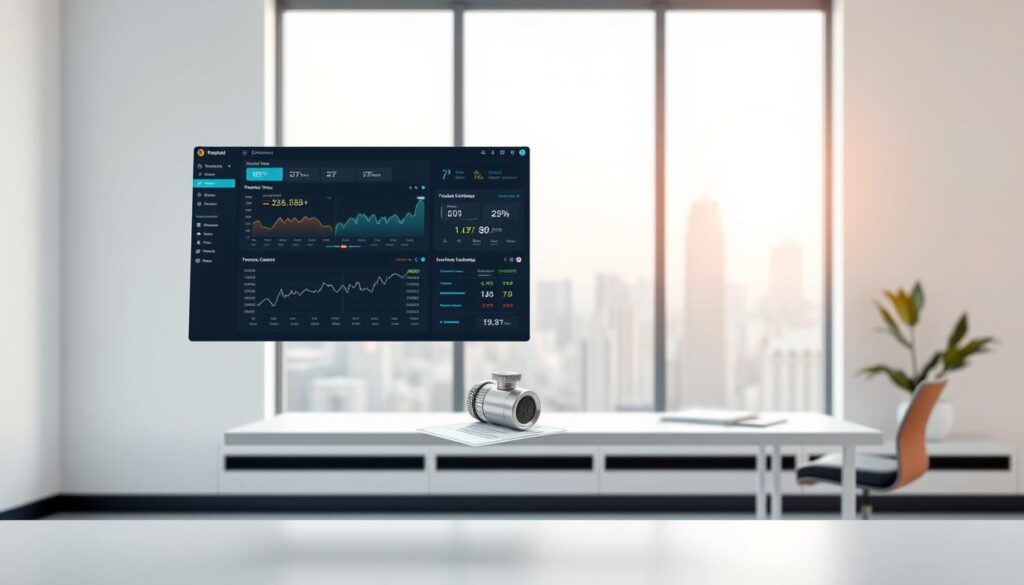Crypto arbitrage is about making money by finding price differences in markets. But, there’s a big catch: taxes. The tax rules for crypto arbitrage are tricky. Traders must keep track of every deal and report their gains to the IRS.
Key Takeaways
- Every crypto arbitrage transaction creates a taxable event under IRS guidelines.
- Cryptocurrency tax implications vary based on holding periods and trading frequency.
- Failure to report profits risks penalties and legal consequences.
- Record-keeping systems simplify compliance during audits or tax filings.
- Strategic tax planning can reduce liabilities while maximizing net profits.
Understanding Crypto Arbitrage and Its Tax Implications
Crypto arbitrage is when you buy digital assets cheaply on one exchange and sell them for more on another. This strategy uses price differences between markets. But, cryptocurrency tax implications make it tricky, as traders must track every move to stay legal.
What Is Cryptocurrency Arbitrage?
Traders use three main ways: spatial, triangular, and temporal. Each method has tax considerations for crypto arbitrage. Since profits are seen as income, they’re taxed.
Why Tax Considerations Matter for Arbitrage Traders
- Fast trades mean more taxes, making reports harder
- IRS rules every transaction, big or small
- Ignoring these can lead to penalties or audits
How the IRS Classifies Crypto Transactions
In 2014, the IRS said crypto is property, not money. This means:
- Capital gains taxes apply to sales
- Cost basis must be tracked for each transaction
- Dividends or airdrops may also incur taxes
Traders must report all activity on IRS Form 8949. Not following these rules can lead to legal and financial trouble.
How the IRS Views Cryptocurrency Activities
The IRS sees cryptocurrency as property, under IRS regulations on cryptocurrency. Taxpayers must report all transactions. Since Bitcoin’s rise, the IRS has updated its rules. This includes Notice 2014-21 and Revenue Ruling 2019-24, which clarify tax rules for gains, losses, and forks.
There are specific tax rules for mining, staking, and airdrops. Mining income is taxed when it’s received. Airdrops and hard forks can also trigger taxes if you transfer them. The IRS uses Form 1040 to check if you’ve followed these rules.
- Mining: Treated as taxable income when received.
- Airdrops: May count as gross income if actively claimed.
- Hard Forks: Taxable if crypto is transferred post-fork.
- Staking: Rewards taxed as ordinary income.
The IRS is cracking down with “John Doe” summonses to find unreported transactions. Traders must keep track of every activity. This is to follow IRS regulations on cryptocurrency and avoid penalties. Staying updated and keeping records is key to compliance.
Tax Considerations for Crypto Arbitrage: Core Principles
Understanding tax considerations for crypto arbitrage is key to avoiding IRS penalties. Every crypto trade, big or small, is taxable. Traders must keep track of each trade’s cost and timing to follow tax planning for crypto trading rules. Not doing so can lead to audits or unexpected taxes.

Every Trade Is a Taxable Event
The IRS sees every crypto swap as a sale. Even tiny arbitrage trades between exchanges are taxable. For instance, swapping Bitcoin for Ethereum at a higher price is taxable income. Not reporting these trades can cause problems with Form 1040 Schedule D.
Gains and Losses Recognition
When you make a trade, the IRS looks at the asset’s value at that time. Short-term gains are taxed more than long-term ones. It’s important to track losses and gains well, using tools like blockchain ledgers. This helps avoid underreporting.
Wash Sale Rules and Crypto
Crypto trades don’t follow the same wash sale rules as stocks. You can sell an asset at a loss and buy it back right away without IRS penalties. Keeping detailed records is crucial to prove your basis during audits.
Tax Basis Determination
The cost basis includes the purchase price and fees. You can use FIFO (First-In, First Out) or specific identification to figure out which coins’ basis to use when selling. Tools like CoinTracker or Koinly help track this for frequent traders. Accurate tracking lowers the risk of audits.
Calculating Capital Gains on Arbitrage Profits
Understanding capital gains tax on crypto starts with knowing tax brackets. Short-term gains are taxed like regular income if assets are held less than a year. Long-term gains have lower rates and apply after a year. These rules guide tax planning for crypto trading.
Short-Term vs. Long-Term Capital Gains
Short-term gains are taxed at higher rates (up to 37%). Long-term gains have rates from 0% to 20%. It’s crucial to track how long you hold each crypto unit. For instance, selling Bitcoin after 365 days gets you lower long-term rates.
Accounting Methods: Choosing Your Strategy
- FIFO (First-In-First-Out): Uses the oldest units first, often leading to higher long-term gains.
- LIFO (Last-In-First-Out): Uses the newest assets, potentially lowering taxable profits in volatile markets.
- Specific Identification: Allows choosing specific lots to minimize tax impact, requiring detailed record-keeping.
Example Arbitrage Tax Scenarios
Imagine buying $10,000 Ethereum on Exchange A and selling $12,000 on Exchange B. If held for 11 months, it’s short-term taxed. Using specific identification to pick cheaper lots could lower taxable profit. Another example: holding Bitcoin for 14 months and selling at a $20,000 gain gets you 15% long-term rates instead of 35% income tax.
Cross-Border Arbitrage: Tax Complexities
Cross-border crypto arbitrage brings unique tax challenges under U.S. law. U.S. taxpayers must report all global crypto profits, even those earned abroad. This is due to IRS regulations on cryptocurrency. Trades across borders require filings like Form 8938 and FBAR if foreign accounts hold crypto assets over IRS thresholds.
Traders using foreign exchanges must report twice: to the IRS and possibly foreign tax authorities. Key compliance points include:
- Reporting foreign crypto accounts on FinCEN Form 114 (FBAR) if total value exceeds $10,000.
- Disclosing non-U.S. crypto holdings on IRS Form 8938 for income above $50,000 (single filers).
- Tracking exchange rates to calculate taxable gains in U.S. dollars accurately.
Tax treaties can help avoid double taxation, but they’re complex. Foreign tax credits can offset U.S. taxes, but you need to keep detailed records. Without proper tracking of rules, traders face penalties or audits. To stay compliant, align cross-border strategies with IRS rules and keep detailed transaction logs.
Record-Keeping Requirements for Crypto Arbitrage Traders
Cryptocurrency tax rules require tracking every transaction. Arbitrage traders need to keep detailed records for accurate tax reporting. Not doing so can lead to penalties or audits.

Essential Transaction Data to Track
- Acquisition date and cost basis for every asset
- Exact sale dates and proceeds
- Exchange fees and platform transaction IDs
- Wallet addresses involved in transfers
Portfolio Management Tools for Tax Purposes
Tools like CoinTracking or Koinly make tracking trades easier. They connect with exchanges, calculate gains, and prepare reports for the IRS. Spreadsheets can’t keep up with the volume of arbitrage trades.
How Long to Maintain Records
- Keep trade records for at least six years as the IRS requires
- Store backup copies safely, either digitally or on paper
- Include original trade confirmations and fee schedules in your records
Without organized records, the risk of audits goes up. Use timestamped backups and check exchanges often to prevent errors.
Tax Reporting Forms and Deadlines for Crypto Traders
Crypto arbitrage traders must focus on tax reporting for crypto profits to avoid penalties. The IRS needs specific forms for accurate cryptocurrency tax compliance. Here’s what to file and when:
- Schedule D: Reports capital gains/losses from crypto trades. Required for most taxpayers.
- Form 8949: Details each transaction’s cost, sale price, and date. Attached to Schedule D.
- Form 1099-B/1099-DA: Brokers issue these forms for trades on exchanges. Keep copies for records.
- Form 1040 Schedule C: Self-employed traders claiming business expenses must file this.
- FinCEN Form 114: Required for foreign crypto accounts exceeding $10,000 annually.
Filing deadlines are the same as standard tax returns: April 15 for annual reports. If taxes owed are more than $1,000, you must make estimated quarterly payments. Missing deadlines can lead to penalties up to 25% of owed taxes. Extensions (Form 4868) give a six-month filing delay but don’t pause payment deadlines.
Keep track of deadlines in a calendar and use crypto tax software to auto-populate forms. Late filings or incomplete data increase audit risks. Stay compliant to protect profits and avoid legal issues.
Common Tax Pitfalls in Crypto Arbitrage
Even experienced traders can fall into tax traps. tax planning for crypto trading requires careful attention to avoid fines. Here are key mistakes to dodge for better cryptocurrency tax compliance.
Overlooking Small Transactions
Every trade matters, even small ones. The IRS wants you to report all trades, big or small. For example, a $50 profit in 100 trades adds up to $5,000.
High-volume traders must record every trade to follow the rules.
Exchange Fee Deduction Mistakes
- Exchange fees (e.g., Binance, Coinbase) can be deducted as investment expenses.
- Misclassifying fees as operating costs or forgetting them can lead to higher gains.
- Keep track of fees in platforms like CoinTracking or Koinly.
Misunderstanding Like-Kind Exchange Rules
Many think crypto swaps qualify for Section 1031 like-kind exchanges. But the 2017 Tax Cuts and Jobs Act eliminated this for digital assets. Swapping Bitcoin for Ethereum is taxable, unlike real estate swaps.
Proactive tax planning for crypto trading can avoid these mistakes. Use tools to track fees, small trades, and swaps. Regular checks with tax experts ensure you follow cryptocurrency tax compliance rules. Ignoring these can lead to audits or fines—don’t let mistakes cost you profits.
Tax-Efficient Strategies for Crypto Arbitrage
Effective tax strategies for crypto investors need early tax planning for crypto trading. Traders can cut down on taxes using methods that follow IRS rules. Start by planning when to trade to get the most deductions or delay gains. For instance, holding assets for over a year can lower short-term to long-term rates.
- Use tax-loss harvesting to offset gains by selling losing positions before year-end.
- Qualify for mark-to-market accounting if meeting IRS trader criteria, simplifying basis calculations.
- Explore self-directed IRAs to shelter gains from taxable accounts, though crypto IRA options remain limited.
Donating appreciated crypto assets to charity can erase capital gains taxes and give deductions. Keep track of all transactions—every buy, sell, or swap is taxable. Tools like CoinTracker or Koinly can help keep records accurate. Don’t make last-minute decisions; plan ahead for yearly moves to avoid surprises.
High-volume traders might need professional help to understand complex rules. Legal strategies are available—but ignoring IRS rules can lead to penalties. Start early with tax planning for crypto trading to use compliance as a competitive edge.
Professional Help: When to Consult a Crypto Tax Specialist
Understanding crypto tax rules is crucial. Traders dealing with complex situations might need help. Here’s when to seek professional advice.
Signs You Need Professional Tax Assistance
- High-frequency trades or large portfolios creating intricate tax strategies for crypto investors.
- Using multiple exchanges or platforms, complicating record-keeping.
- Engaging in DeFi protocols, staking, or yield farming.
- Unusual losses or gains exceeding $10,000 requiring precise reporting.
Qualities of a Crypto Tax Professional
Look for advisors with:
- Experience handling crypto-specific cryptocurrency tax compliance cases.
- Certifications like CPA or CFP specializing in digital assets.
- Knowledge of tools like CoinLedger for accurate tracking.
Cost-Benefit of Professional Help
Consider the costs against the benefits like:
- Potential savings from optimized deductions.
- Risk reduction of penalties or audits.
- Time saved managing complex filings.
Professional help ensures you follow the rules and make the most of your investments. Choose advisors who get the unique challenges of arbitrage.
Automated Tax Solutions for High-Volume Arbitrage Traders
High-volume crypto arbitrage traders deal with complex tax issues. Automated software helps by tracking trades, calculating gains, and creating tax forms. Tools like CoinTracker, TokenTax, Koinly, and ZenLedger make it easier by connecting to platforms like Binance and Coinbase.
- CoinTracker offers advanced FIFO/LIFO methods and supports over 50 exchanges.
- TokenTax provides audit trails and integrates with professional tax software like TurboTax.
- Koinly automates wash sale detection and supports 400+ exchanges.
- ZenLedger focuses on cross-border reporting and NFT tracking.
These tools help avoid manual errors but have their limits. Users must check transaction imports and fix any issues. Traders who make many trades should look for platforms that track in real-time and have API integrations.
Regular audits are key to keeping records accurate in fast-changing markets. While automation saves time, it’s important to double-check reports for tax compliance.
State Tax Considerations for Crypto Arbitrage
Crypto arbitrage deals with both federal and state taxes. Traders need to know how their state handles crypto gains and losses. States like Texas, Florida, and Wyoming don’t tax income, which is good for tax considerations for crypto arbitrage.
On the other hand, states like California and New York treat crypto as income. This makes things more complicated for traders.

High-Tax vs Low-Tax States
- States without income tax: Texas, Florida, and Wyoming provide tax-friendly environments.
- High-tax states: California and New York require reporting crypto profits as taxable income.
- Some states follow federal crypto tax rules; others impose unique requirements.
State-Level Reporting Requirements
Many states ask for Form 5498 or similar for crypto activities. Traders must keep track of their transactions in states where they live or work. Not reporting can result in penalties. Always check the state’s rules for digital asset reporting deadlines.
Residency Planning Considerations
Where you live affects your state taxes. Moving to a low-tax state can lower your taxes. But, states look at things like where you live and how long you stay to decide if you’re a resident. It’s wise to talk to a tax advisor to figure out the best tax strategies for crypto investors and residency rules.
Traders who work in multiple states must file taxes in all of them. Keeping track of how much time you spend in each place can help avoid problems.
IRS Enforcement and Audits: What Arbitrage Traders Should Know
The IRS is strict on IRS regulations on cryptocurrency. They focus on traders who don’t follow cryptocurrency tax compliance. Audits now target digital asset owners. Special teams check their transactions and reports.
- Large unreported gains or losses
- Inconsistent transaction records
- Missing Form 1040 Schedule 1 entries for crypto income
Not following the rules can lead to big fines. You could face 20% of what you owe in fines. If it’s on purpose, it’s up to 75% plus criminal charges. If audited, you’ll need to show:
- Trade logs with dates, prices, and IDs
- Proof of cost basis calculations
- Documentation for deductions
Being proactive helps. Use IRS-approved software to track your trades. Reconcile exchanges yearly and fix any issues early. Ignoring IRS regulations on cryptocurrency increases your audit risk. Regular checks with tax experts keep you in line with changing rules.
Knowing about cryptocurrency tax compliance helps avoid fines. It keeps you legal in a closely watched area.
Legal Entities and Their Impact on Arbitrage Tax Liability
Choosing the right legal entity is key to how crypto arbitrage profits are taxed. tax strategies for crypto investors must match the entity choice to reduce taxes and increase deductions.
Sole Proprietor vs. LLC vs. Corporation
Traders face different tax outcomes based on entity type. A sole proprietorship mixes personal and business finances, reporting income on Schedule C. LLCs offer liability protection and pass-through taxation. Corporations may face double taxation but offer unique deductions and retirement plans.
Each structure impacts self-employment taxes, profit distribution, and what expenses can be deducted.
Business Expense Deductions for Traders
Legal entities allow for deductions in several areas:
- Home office space used for arbitrage
- Software subscriptions (e.g., trading platforms)
- Professional fees (accountants, attorneys)
- Continuing education related to crypto markets
Retirement Planning Through Business Entities
Entities open up tax planning for crypto trading chances like Solo 401(k)s or SEP IRAs. Corporations might qualify for higher-contribution defined benefit plans. Setting up as a business also makes it easier to prove trader status to the IRS, important for deducting losses and expenses.
Keeping formal entity records—like operating agreements or corporate minutes—is crucial. It helps avoid piercing the liability shield and ensures tax compliance.
Staying Compliant While Maximizing Your Arbitrage Profits
Staying on top of cryptocurrency tax rules is key to making the most of your profits. Keeping accurate records helps you report taxes correctly and avoid fines. Tools like CoinTracking or Koinly can help track your trades and file IRS forms like Form 1040 Schedule D.
It’s important to keep up with IRS and state tax laws, as they change. For example, California has higher taxes on crypto profits than Wyoming. Choosing where you live and what legal structure you use can help lower your taxes.
Using automated tools can make tax compliance easier without cutting into your profits. Working with tax experts can also help you avoid mistakes and claim all the deductions you’re allowed. Don’t forget to account for small trades and follow the wash sale rules.
Make a yearly checklist to keep your tax records in order. Check your tax basis, verify Form 8949, and update your software. Also, stay alert to new tax laws, like changes in how crypto is taxed. Planning ahead helps you stay compliant and grow your profits.
To increase your earnings, use strategies like tax-loss harvesting or holding onto investments for longer. Platforms like Cryptomaximal’s cashback programs can also add to your profits. By combining these strategies with careful tax tracking, you can build a profitable and compliant operation.
FAQ
What are the tax implications of engaging in cryptocurrency arbitrage?
Cryptocurrency arbitrage is about buying and selling digital assets to make money from price differences. Each trade is taxed, leading to capital gains tax on profits. It’s important to know these tax rules to follow IRS guidelines.
How does the IRS classify cryptocurrency transactions for tax purposes?
The IRS sees cryptocurrencies as property, not money. This means you must report all profits and losses as capital gains or losses. You’ll need to use Schedule D and Form 8949 for tax reporting.
Are there specific record-keeping requirements for crypto traders?
Yes, crypto arbitrage traders need to keep detailed records. You should track when you bought and sold, the cost, sale price, and any fees. These records are key for tax compliance and can help during audits.
What strategies can help minimize capital gains tax on cryptocurrency trading?
Using tax-loss harvesting can reduce your tax bill by offsetting gains with losses. You might also consider getting trader tax status, using mark-to-market accounting, or trading in retirement accounts for tax benefits.
How do wash sale rules apply in the context of cryptocurrency?
Wash sale rules don’t apply to cryptocurrencies like they do to stocks. This means you can sell at a loss and buy back right away without losing the deduction. But, keep an eye on changes in regulations.
What is the significance of using automated tax software for crypto trading?
Automated tax software can make tax planning easier by tracking trades and calculating gains. Tools like CoinTracker or Koinly help with accurate reporting and save time, especially for active traders.
How do state tax laws affect crypto arbitrage traders?
State tax laws differ, with some states not taxing income and others, like California, having high rates. Traders should know their state’s tax rules and consider residency planning to manage taxes better.
When should a crypto investor consider seeking professional tax help?
Seeking a crypto tax expert is wise for complex situations like high trading volumes or significant profits and losses. A professional can offer strategies for tax compliance and help with IRS rules.


No comments yet